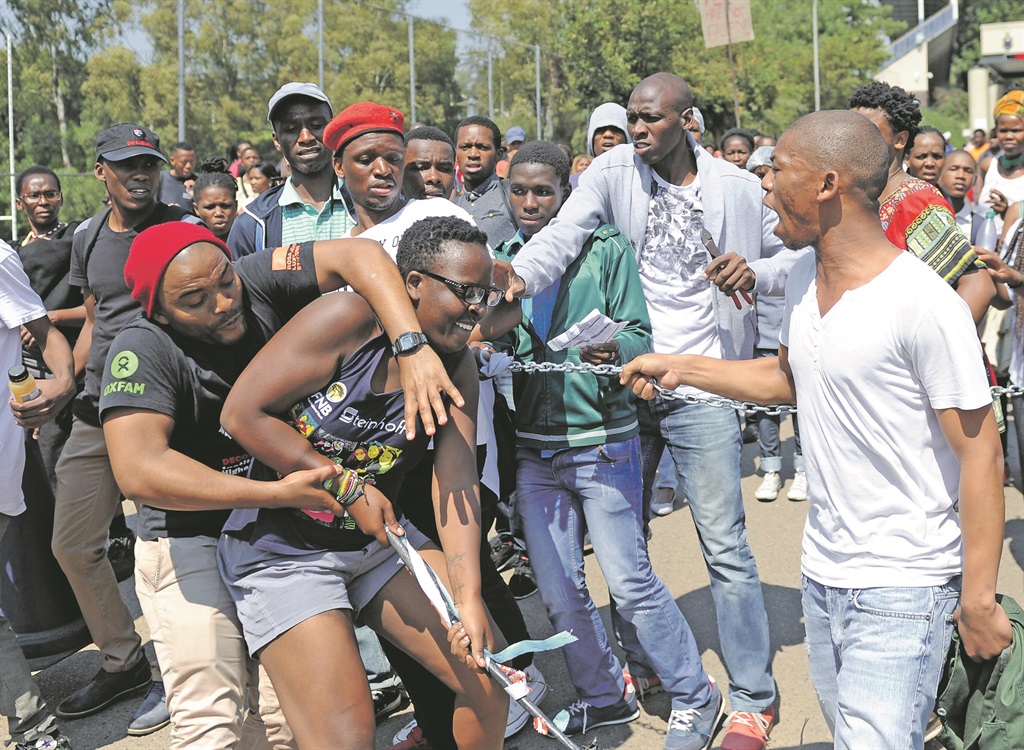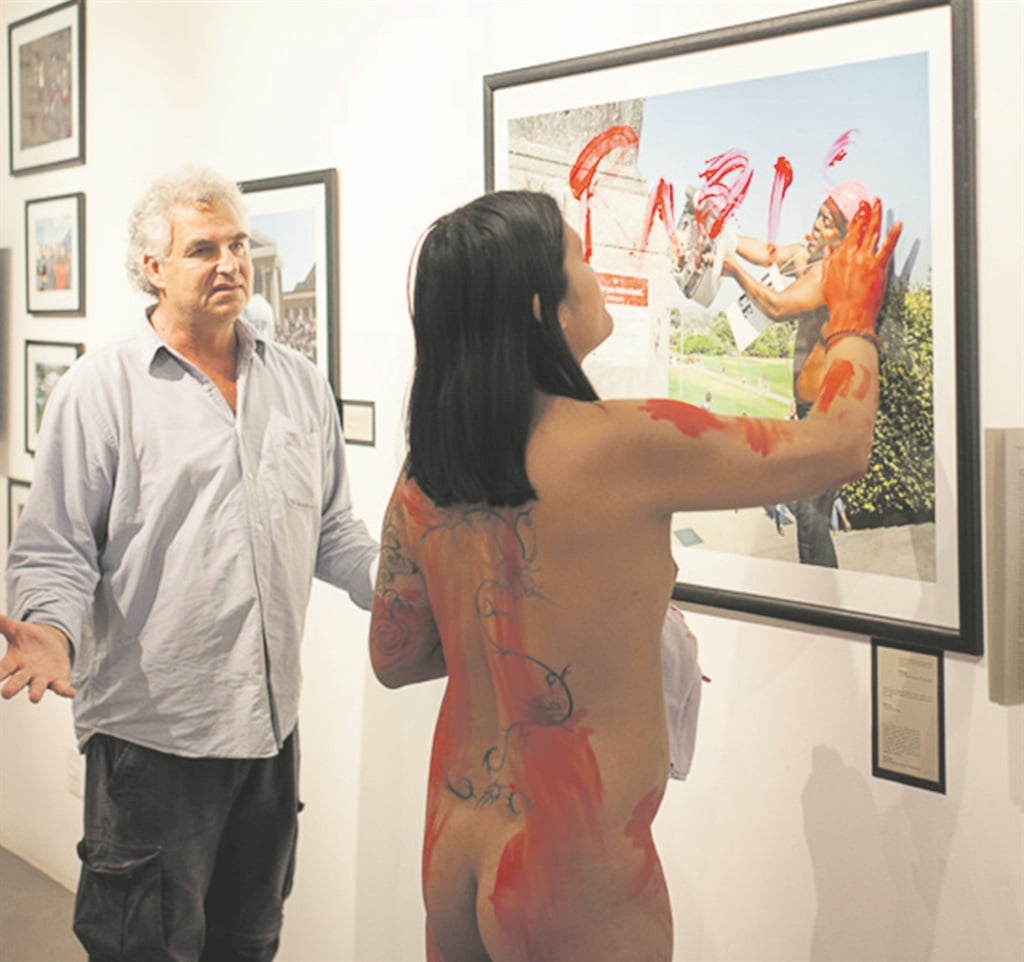
If black lives matter, do lesbian and transgender lives matter as much as men’s? It’s a question that the #FeesMustFall movement has been forced to confront. Ndileka Lujabe speaks with several bold young female leaders in the student movement who refuse to be silenced
“Violence doesn’t always have to be physical. The silencing and erasure of queer and feminist voices is violent,” says Wanelisa Xaba, wearing her trademark nose ring and black lipstick.
There are nods of agreement from her fellow student activists in a coffee shop on the Wits University campus.
And then, sometimes, violence is physical.
“If you make me feel unsafe in a movement that’s meant to be safe, I will retaliate,” says Xaba.
My mind immediately goes to a watershed moment in the #FeesMustFall movement’s history.
The woman with the sjambok
In April, not far from where we are sitting, lesbian activist and anthropology postgraduate student Thenjiwe Mswane was assaulted by male students during a protest.
Photos of her holding a sjambok and being
manhandled by prominent #FeesMustFall leader Chumani Maxwele spread rapidly on social media. She and other women had been growing increasingly annoyed at being sidelined and left out of the loop.
“We got to that protest and it appeared to have been planned beforehand. I was there with my girlfriend and two other friends, and we asked one of the leaders what the protest was about, but he didn’t want to tell us.
“We asked if queer bodies were allowed and he said no,” Mswane tells me when I meet up with her and her girlfriend the next day.
“I asked him repeatedly to clarify and he finally said: ‘People like you are not allowed here, go.’ That is when I became angry,” Mswane said.
So she and her friends went and bought sjamboks in nearby Bree Street and returned to the protest to address the exclusion.
“We approached the leader again, telling him to repeat what he’d said earlier. We were hitting our sjamboks on the ground.
“They ignored us and continued marching. Chumani came forward and told us to get out the way and I refused, saying we would no longer be sidelined,” she recounts.
She was then hit by men who were trying to get her to leave. Maxwele later denied assaulting her, saying he was trying to move her to safety.
“The movement has always been patriarchal, but we went in there thinking our blackness would unite us, and we’ll then conscientise each other about different forms of oppression,” Mswane says.
“What’s been the most violent thing for me are the things I’ve been called. I was told that I’m recruiting for lesbianism and had a lesbian agenda. They said I was a state agent who was using my sexuality for state purposes, to collapse the movement.”
Mswane says she doesn’t regret buying the sjambok which for her symbolises power.
“When sjamboks are in the hands of black women who’ve been on the receiving end of all kinds of whipping for years, sjamboks represent power and resistance.
“We got pushed to that point where we had to take back our power by any means necessary.”
Back in the coffee shop at Wits, Xaba, who identifies as queer and is doing her master’s at the University of Cape Town (UCT), says the #FeesMustFall movement has been a watershed in political activism around transformation and decolonising institutions, but the movement is under threat of being derailed by violence inflicted on lesbian, gay, bisexual, transgender, intersex and queer (LGBTIQ) people.
“The movement was not intersectional. Queer bodies were objectified; they were just ticking boxes. What they thought was intersectional wasn’t what was happening on the ground,” she says.
Zazi Dlamini, a liaison and advocacy officer at Gay and Lesbian Memory in Action (Gala), says we need to think beyond the meaning of visibility and the language around intersectionality and what it actually means. “We put our bodies on the front line, but we have very limited agency,” she says.
What is intersectionality?
I ask Mswane to explain what intersectionality means to her.
“Just because I am not oppressed in a certain way doesn’t mean other people aren’t oppressed in a certain way. As a person who’s in a position of privilege, when somebody – whether a woman or a queer person – says they are being oppressed, you need to sit down and listen,” she says.
“So when we continue to fight [in movements], you know you’re not just fighting for yourself. It means being against all forms of oppression and not just speaking to the oppression that oppresses you. I am not oppressed just because I’m black. I’m also oppressed because I am a woman and I’m queer. You can’t step into the space of #FeesMustFall and just be black, or be in a queer space and just be queer and not black. You’re made up of all these struggles in one body and can’t strip yourself away from them. You’re black, queer, poor, a woman and trans simultaneously.”
The fight to acknowledge LGBTIQ struggles as intersectional and part of the broader struggle at Wits is no different on other campuses. Xaba says that UCT’s #RhodesMustFall movement is a reflection of broader South African society.
“It is patriarchal and transphobic. Within the mix, you also then get queer people who are classist; there are a lot of things at play ... Things are far from intersectional,” she says.
“We felt unsafe and were blatantly told we’d be removed from the movement if we tried to push forward any feminist or queer agendas.”
But that has not stopped feminists and LGBTIQ activists, who have been at the forefront of #FeesMustFall as organisers. In fact, it has emboldened them. In Cape Town, transgender students have also disrupted the movement in their demand to be recognised as equal.
Bloody paint in the art gallery
Echoing Voices From Within was an art exhibition held at the Centre for African Studies Gallery in Cape Town, which began in March. It was billed as a multifaceted show reflecting the #RhodesMustFall movement.
But members of UCT’s nongovernmental organisation Trans Collective were angered by the exclusion of the transgender struggle. They disrupted the exhibition on March 9 by smearing photographs with red paint and blocking the entrances to the gallery with their painted, naked bodies. The exhibition, showcasing a record of events of a year of student protest, was shut down.
Printed on a pink piece of paper plastered over one of the photographs was: “We will not have our bodies, faces, names and voices used as bait for public applause.”
Another read: “#RhodesMustFall will not tokenise our presence as if they ever treasured us as part of their movement.”
The Trans Collective is an organisation of transgender, gender nonconforming and intersex students who played integral roles in the #RhodesMustFall movement.
“The Trans Collective emerged out of a void in the decolonisation discourse,” said co-founder and student activist Sandile Ndelu last year. “As black trans women, we weren’t being listened to... so we started this safer space to raise a very particular agenda.”
Only three out of more than 1 000 images that ended up making it into the exhibition featured a trans person’s face.
“Our role has now evolved into speaking back to #RhodesMustFall and keeping it accountable to its commitment to intersectionality,” Ndelu added.
Fellow co-founder and former chairperson of transformation and social responsiveness on the UCT Students’ Representative Council, Thato Pule, said at the time that they still held decolonisation as the premise of the #RhodesMustFall movement, but they also had to degender the movement.
“We want to give content to decolonisation. We’re trying to normalise our experience, and we’re using our bodies because we’ve realised our bodies are very political,” said Pule, a transgender woman.
“These words [black transgender woman] describe my political identity and reality. All three words are a description of how I need to be emancipated from structural oppression‚” she wrote in an open letter to UCT students.
Mswane says the way the #RhodesMustFall movement is being remembered is as if the male leaders were the only ones who did the work.
“When the movement gained traction in October last year, some people started wearing T-shirts displaying a political alliance and when queer people joined in, it was made to seem as if we were trying to insert ourselves into their space, but black queer women had actually been at the centre of that space,” Gala’s Dlamini says.
“If you look at historical movements, black women and queer bodies have been removed from the narrative,” says Mswane. “We don’t hear enough about women and their roles in revolutions; it’s as if they didn’t exist.”
We don’t need another hero
Over coffee, Dlamini addresses the “hero worship” at play in the movement which she says is dangerous “because it can be used against us and completely collapse our goals”.
Mswane adds: “Here at Wits, it’s how people address Nompendulo Mkatshwa in a way they will not address Vuyani Pambo. Vuyani isn’t called to meetings where he is necklaced or talked down to.”
Dlamini says: “We need to keep showing up, learning and unlearning things, and call people out when they do wrong. Patriarchs aren’t the alpha and omega of black lives. Wherever there is tension, we need to question and discuss it. That is how we open things up just a bit more.”
Dlamini is working on a project with young queer people in the arts to document queer lives and experiences. “We plan to launch the project in September and hope to confront erasure and ‘visibilise’ the lives of queer youths.”
It is through constantly fighting for recognition that a new generation of LGBTIQ leaders is emerging.
This series on LGBTIQ life in Africa is made possible through a partnership with The Other Foundation. To learn more about its work, visit




 Publications
Publications
 Partners
Partners









